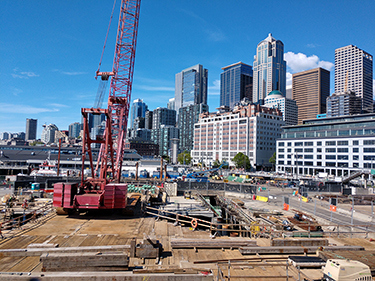|
Subscribe / Renew |
|
|
Contact Us |
|
| ► Subscribe to our Free Weekly Newsletter | |
| home | Welcome, sign in or click here to subscribe. | login |
Construction
| |
May 14, 2020
Contractors face fuzzy rules, delays as coronavirus plays out
Journal Construction Editor
A panel of three lawyers took on some pressing issues facing contractors as a result of the COVID-19 pandemic during a webinar on Monday put on by the Associated General Contractors of America.
One of the larger issues has been complying with rules revolving around the coronavirus.
“We are all trying to figure out on the fly what is best for our companies,” said Ronald Ciotti, a partner in construction and public contracts with Hinckley Allen, an East Coast law firm.
Bryan Kelley, vice president-legal of Seattle-based Howard S. Wright, a Balfour Beatty Co., said contractors have been at a slight disadvantage because the definition of which projects are “essential” (and can continue) and which are not wasn't drafted by construction people. He said contractors in some cases might want to ask owners to get clarification from the government on whether a project can proceed.
Kelley said an example of those changing rules involves the requirement to check workers' temperatures as they enter the jobsite. He said an industry roundtable assembled to advise Gov. Jay Inslee helped develop the phase one plan to get non-essential construction work back online, but didn't specifically include temperature testing.
On April 24, Inslee announced the phase one plan, which included maintaining 6 feet of social distance, but didn't emphasize the temperature-taking rule in a press conference. Hours later, phase one guidelines were issued that contained the temperature test rule.
Kelley said communicating the temperature test rule on a Friday afternoon resulted in contractors scrambling to get scarce temperature measuring devices so they could open the following Monday.
Kelley said his firm has had a few owners decide to suspend work rather than to try to figure out what Inslee's stay-at-home proclamation means.
Ciotti said as rules have changed, so have the definitions of “essential” services and activities.
Bob Majerus, vice president and general counsel of Hensel Phelps in Colorado, said it's been a challenge to understand every state's order since his company works in about 30 states. Then, he said, rules can vary by county and in some cases by city. He said you need to know whose order your project falls under, which isn't always obvious.
“The bottom line is which jurisdiction can shut your project down?” Majerus said.
The solution, he said, is to follow the most restrictive rules and monitor every jurisdiction you are working in.
Ciotti said contractors also need to consider where significant subcontractors and material suppliers are located, which may have additional rules.
Then there's the big question of who is responsible to pay for coronavirus-related delays on projects. In response to a gallery question on whether one could refuse to work unless an owner paid for such impacts, the panel advised to closely read your contract.
“If you guess and you guess wrong, you've now got two problems: You've got the added costs of complying with the safety procedures plus you're potentially in breach of contract for walking off a job,” Kelley said. It's always best to get outside legal counsel before stopping work, he added.
Kelley said he has seen an uptick over the past two months in parties receiving outside legal advice, including emails and letters from subcontractors and owners that were “obviously ghostwritten by outside counsel.”
Subcontractors not returning to jobsites can also be a problem. Majerus said if a project hasn't been shut down by the government or owner, subcontractors should have a good reason for not being on the job, such as positive COVID-19 tests taken at the site. He said they can't just say they're not comfortable with the jobsite.
Kelley said if a worker doesn't feel safe to return to work, the contractor should not retaliate or force the worker to use paid time off.
Majerus said contractors should have an entire protocol set up when a positive COVID-19 test appears. That includes a bullet point policy for workers to follow, with no guesswork involved.
“If you haven't had a positive test on one of your sites yet, you are extremely lucky because it will happen,” he said. “And we've had a few.”
Once a positive case is identified, the contractor should seal off the area and do a deep cleaning, preferably with a third party that specializes in that, Majerus said. The quicker you lock down the site, the faster you can get it back up running, he added.
All of this newfound confusion has benefited one industry: lawyers.
Ciotti said he's never been busier in his career.
(Editor's note: This article has been changed to clarify that the roundtable's recommendations didn't include temperature testing; and who is responsible to pay for coronavirus-related delays.)
Benjamin Minnick can be
reached by email or by phone
at (206) 622-8272.



